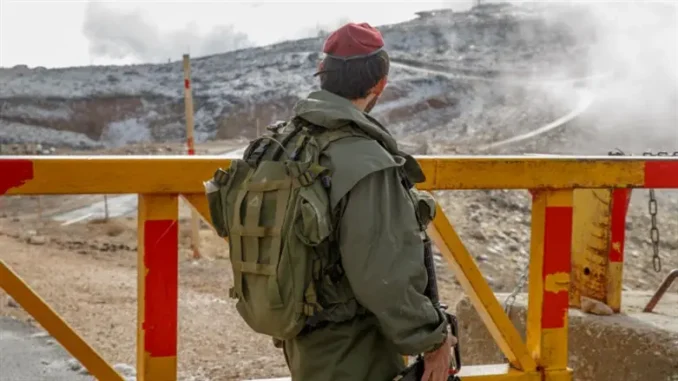Israel’s defense establishment is preparing for the worst-case scenario during a war on the northern border, which would include days-long blackouts, hundreds dead, and thousands wounded.
In the shadow of Israel’s internal dispute surrounding the government’s judicial reform plan, unusual cross-border incidents between Israel and Hezbollah in recent weeks and months show a noticeable rise in the probability of a war on the Israel-Lebanon border.
Israel Hayom reported that security officials predict that if such a war were to break out, it would not be limited to one front but rather be a multi-front campaign. It is not unforeseen that Gaza would also join the fray, forcing Israel to contend with terrorism in Judea and Samaria, violence and roadblocks in Israel, and additional threats as well.
According to the report, the situation that Israel’s civilian sector is preparing for is considered the worst-case battle scenario by security officials.
In such a scenario, over the course of one day of battle, Israel would have to contend with thousands of rockets fired, and within the first few days, about 6,000 rockets would be launched at the Jewish state. As time progresses, the number would decline to about only 1,500 to 2,000 rockets a day.
Security experts estimate that every day, there will be approximately 1,500 effective strikes in Israeli territory, and that is after subtracting rockets that statistically land in open areas and interceptions by the Iron Dome system, which, with all due respect, would not manage to intercept the high percentage of missiles which we have gotten used to during confrontations in the south.<
To compare, during the recent round of fighting, Operation Shield and Arrow, 1,470 rockets were fired at Israel from Gaza during the entire five-day period. During Operation Guardian of the Walls in May 2021, 4,500 rockets were launched in 10 days. In 2014, during Operation Protective Edge, which lasted 50 days, approximately 3,850 rockets were fired (an average of 90 a day). As one can see, the number of launches in a potential war in the north would be far more substantial.
In light of the predicted scope of rocket fire, according to the defense establishment’s updated scenario, a joint campaign led by Hezbollah would claim the lives of approximately 500 Israeli civilians on the homefront (the number does not include fallen soldiers), and thousands more would be wounded. But despite the shocking numbers, what disturbs the defense establishment above all is the growing precise abilities around Israel’s borders.
Security officials say that one of the substantial lessons learned from the war in Ukraine is the effectiveness of unmanned aircraft.
As part of the scenario, the defense establishment is not ruling out the possibility that Hezbollah, Iran, or their proxies would manage to harm known and static strategic facilities in Israel, such as electricity, in a way that would cause an hours-long or even days-long countrywide blackout. According to the scenario, Israel would be in the dark for 24 to 72 hours.
The severe fear is of a precise strike on the power stations, which would critically impair Israel’s ability to create electricity. Without electricity, communication would also be severely disrupted, the cellular infrastructure for consumers would be disrupted, and even the ability to warn against incoming missiles would be critically harmed. Officials say that the answer to the challenge is still not perfect, and the intention is to increase the effective defense of those sites and to attach an Iron Dome battery and other means to them, with a strict interception policy.
Another challenge that is no less substantial would be the internal front, and it is not unforeseen that Israel would have to contend with dozens of internal riots at a time. To clear roads for forces and to deal with riots on the homefront so they would not disturb the soldiers on the battlefield, the IDF created 16 reserve brigades.
Amid this nightmare scenario, which the defense establishment considers “severe yet plausible,” Israel’s exhibited lack of will to be drawn into a conflict and its policy of responding moderately to Hezbollah provocation can be understood.




Israel has a very woke military. Hezbollah attacks when Iran says so. What will Israel do against Iran is the question and I fear the answer is not a damn thing but the IDF generals will blame Netanyahu, Global Warming and Justice Reform.
Israel is completely at fault for allowing such a threat to be
1) established on the border of a country still at war with Israel.
2) to allow the rocket threat to increase almost daily without severe response.
3) Israel should have immediately bombed the missile sites out of existence ,each time, untl FINALLY,….
4) Israel should have given a stern warning that at the first sign of any more “buildup of threats” , to take over the area from the Litani down.
5) Demonstrate that Israel could easily reach Beirut, especially it’s vital structures and the airport…
In other words SHOW STEEL TEETH, …..
International opprobrium would be natural but could be ignored as the reasons would be self-evident. Israel had a perfect response at the UN.
Vivarto, you are 100% correct. Instead of rushing to help Ukraine, Israel should team up with Russia. There is no benefit at all for israel to help ukraine. On the other hand there are tremendous benefits for israel to team up with Russia.
And yes of course, any normal country would have expelled or killed any enemies of the sate like disloyal palis.
Russians have developed effective cyber-defense from rockets and drones. Especially drones, which initially were very effective, now are mostly neutralized.
I suggest that Israel cooperate with Russia and exchange information, in exchange for support against Iran, and also, support in the UN.
So that for once, Israel can complete the job in Lebanon, without security council voting to stop it.
Still better, expel the disloyal “Palestinians” to Jordan, or to Sweden.